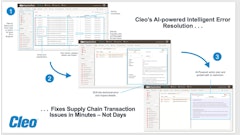
The global supply chain faces unprecedented challenges, from geopolitical uncertainties to evolving consumer demands. In this landscape, the ability to swiftly adapt has become essential. While automation has long been a part of supply chain operations, the next frontier lies in optimizing one of its most complex and resource-intensive aspects: negotiation.
AI Agents conducting autonomous negotiations are emerging as a game-changer for procurement teams. Unlike traditional human-led negotiation processes, autonomous systems are increasingly being adopted to handle large volumes of supplier contracts, streamlining processes and reducing negotiation timeframes.
Traditional negotiations are time-consuming, often requiring weeks or even months to finalize terms. Human negotiators are limited by bandwidth, cognitive biases, and a narrow scope of data analysis. This has become increasingly difficult as procurement teams have been whittled down to a handful of people at most. By contrast, AI-driven autonomous negotiation tools can analyze extensive amounts of data in real-time, identify mutually beneficial terms, and reach agreements faster than ever before.
For example, autonomous negotiation platforms have been used by large enterprises to optimize vendor agreements, achieving outcomes that would be impossible to accomplish manually with over 100,000 vendors for a single company. These systems leverage machine learning algorithms to understand both parties' priorities and constraints, aiming for Pareto optimality—a state where no further improvements can be made without making one party worse off.
Key Benefits of Autonomous Negotiation
Speed and Efficiency: Autonomous negotiation platforms can handle contract renewals, pricing adjustments, and service-level agreements at a pace that human teams cannot match. This allows procurement teams to focus on more strategic initiatives.
Data-Driven Insights: AI systems continuously learn from past negotiations, improving their effectiveness over time. They can share insights that human negotiators might overlook, such as market trends or supplier performance metrics. These will help with the strategic negotiations still handled by humans.
Scalability: Large organizations manage thousands of supplier contracts. Automating these negotiations can save companies millions in procurement costs while ensuring compliance with corporate policies.
Reduced Bias: AI removes unconscious biases that can influence human negotiators. It ensures that negotiations are based on objective criteria, fostering fair and transparent agreements.
A slew of industries, especially Fortune 500 companies, are already reaping the benefits of autonomous negotiation. In retail, companies use AI tools to renegotiate supplier contracts to account for fluctuating raw material costs. This is going to be a priority in 2025 with the potential for widespread tariffs on international materials. In manufacturing, firms leverage autonomous systems to optimize maintenance contracts and service agreements. Across all sectors, autonomous negotiation is helping businesses become more agile and resilient.
As with any technological advancement, there are concerns about the role of AI in negotiation. While some critics argue that AI may lack the human touch needed to build lasting supplier relationships, through careful design, autonomous systems enhance, not replace, human negotiators. They handle routine tasks, freeing up procurement professionals to focus on strategic relationships and complex negotiations that require a personal touch.
Autonomous negotiation systems are also transparent, allowing companies to set parameters and define acceptable outcomes. This ensures that the AI aligns with the company’s values and goals.
The Future of Procurement
Looking ahead, the future of procurement will be a hybrid model of AI agents collaborating with human expertise to secure the best possible outcomes for all sides. While AI will handle high-volume, low-complexity negotiations, human teams will continue to manage strategic, high-stakes deals.
Organizations that adopt autonomous negotiation early are already gaining a competitive advantage by reducing costs, improving supplier relationships, and becoming more resilient to disruptions. As supply chains become increasingly complex, autonomous negotiation will play an even more crucial role in ensuring operational agility.
The supply chain landscape is evolving rapidly, and companies must adapt to stay competitive. Autonomous negotiation offers a powerful tool for procurement teams to optimize their operations, reduce costs, and build stronger supplier relationships.
As AI technology continues to mature, autonomous negotiation will become a standard practice across industries. Forward-thinking companies that embrace this technology today will be better positioned to navigate tomorrow’s challenges.



















